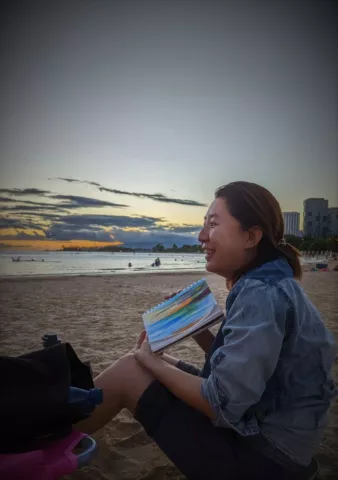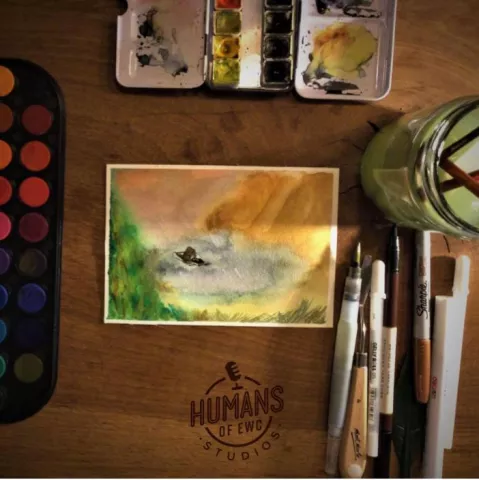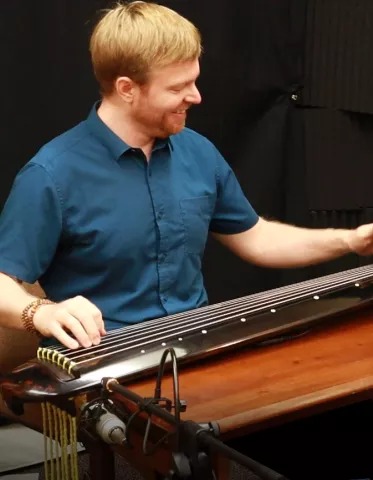Error message
Humans of EWC Studios offers a window into our community for those interested in learning about EWC through a more personal lens. This installment is a dual feature, with a guqin performance by Student Affiliate Jacob Algrim (PhD, Chinese Linguistics) and a watercolor painting by alumni Ying Chen (Graduate Degree Fellow/MA in Sociology, APLP alum, and Office of Alumni Engagement Intern). Together they frame the traditional guqin piece, "Yangguansandie" (a song about friends parting ways), as a reflection on student life, the EWC community, and bittersweet transitions. Below are the extended materials from our social media post.
Yangguansandie
Meet the contributors
You’re listening to a Humans of EWC studio feature. We’re here today with Jacob Algrim. Jacob, can you introduce yourself, please?
Hi! My name is Jacob Algrim. I am a student affiliate at the East-West Center. I grew up in Kansas, I lived in southern China for seven years following the completion of my undergrad degree, and then I came directly from China to the University of Hawaiʻi to begin a PhD program here in Chinese linguistics.
And what do you find unique about living here in community at the Center?
Living at the East-West Center has been a great opportunity to meet a lot of different friends from different places all over the world and to interact with people from a lot of different backgrounds. So I play an instrument that’s not very well known, even in the country where it comes from (China), but I’ve been surprised, just in the kitchen meeting other people that, a lot of people here actually know the instrument that I play (Guqin).
How did you learn about the guqin, how did you go about studying it, and what were the lessons like when you studied it?
So before I ever had any interest in China, I saw a guqin on a Jet Li movie, actually, and just thought it seemed like a really neat instrument. When I ended up living in China, I decided that if I had the opportunity, I’d like to learn it. After a few years of language study, I was able to find a teacher who was willing to take me on as a foreigner to study guqin.
And how were these lessons, I guess, structured, compared to, learning an instrument in, say, growing up in Kansas?
In terms of the music, I learned it as a hobbyist, really. So we never got into music theory, we learned to read the traditional guqin score, which is much different than any other music score. And then a lesson just comprised of sitting directly across from the teacher, each with their own instrument, and essentially just imitating the motions that the teacher was showing me.
So what did studying this music teach you about China, or about yourself?
In terms of learning about Chinese culture, it was definitely a great way to get into traditional culture, even a culture that many modern Chinese might not be a part of. But there’s definitely a growing trend of trying to protect and keep this heritage. More and more people are studying traditional instruments like guqin in China.
It was also a really good opportunity, of course, to practice the language, which I was trying to learn, because most guqin friends that I had didn’t speak English or didn’t speak very much English. And [it was] just a great way to build friendships, because we would frequently have gatherings where we’d have a meal together and then we would just play each other the songs that we’d been studying lately.
Can you describe the song you’re about to play for us? What should the audience listen for, and what’s it about, and why is it important in the literature?
So this song is called Yangguansandie. It’s a very classical Chinese tune, first published in a set of guqin scores over 500 years ago. It’s a song of parting between two friends, where Yangguan is the name of a pass that one friend who is leaving will travel. Sandie refers to the structure of the song, as there’s a refrain that is repeated three times. Repetition, at least in a written guqin score, is not very common.
Humans of EWC Studios offers a window into our community for those interested in learning about EWC through a more personal lens. This installment is a dual feature, with a guqin performance by Student Affiliate Jacob Algrim (PhD, Chinese Linguistics) and a watercolor painting by alumni Ying Chen (Graduate Degree Fellow/MA in Sociology, APLP alum, and Office of Alumni Engagement Intern). Together they frame the traditional guqin piece, "Yangguansandie" (a song about friends parting ways), as a reflection on student life, the EWC community, and bittersweet transitions. Below are the extended materials from our social media post.
Yangguansandie
Meet the contributors
You’re listening to a Humans of EWC studio feature. We’re here today with Jacob Algrim. Jacob, can you introduce yourself, please?
Hi! My name is Jacob Algrim. I am a student affiliate at the East-West Center. I grew up in Kansas, I lived in southern China for seven years following the completion of my undergrad degree, and then I came directly from China to the University of Hawaiʻi to begin a PhD program here in Chinese linguistics.
And what do you find unique about living here in community at the Center?
Living at the East-West Center has been a great opportunity to meet a lot of different friends from different places all over the world and to interact with people from a lot of different backgrounds. So I play an instrument that’s not very well known, even in the country where it comes from (China), but I’ve been surprised, just in the kitchen meeting other people that, a lot of people here actually know the instrument that I play (Guqin).
How did you learn about the guqin, how did you go about studying it, and what were the lessons like when you studied it?
So before I ever had any interest in China, I saw a guqin on a Jet Li movie, actually, and just thought it seemed like a really neat instrument. When I ended up living in China, I decided that if I had the opportunity, I’d like to learn it. After a few years of language study, I was able to find a teacher who was willing to take me on as a foreigner to study guqin.
And how were these lessons, I guess, structured, compared to, learning an instrument in, say, growing up in Kansas?
In terms of the music, I learned it as a hobbyist, really. So we never got into music theory, we learned to read the traditional guqin score, which is much different than any other music score. And then a lesson just comprised of sitting directly across from the teacher, each with their own instrument, and essentially just imitating the motions that the teacher was showing me.
So what did studying this music teach you about China, or about yourself?
In terms of learning about Chinese culture, it was definitely a great way to get into traditional culture, even a culture that many modern Chinese might not be a part of. But there’s definitely a growing trend of trying to protect and keep this heritage. More and more people are studying traditional instruments like guqin in China.
It was also a really good opportunity, of course, to practice the language, which I was trying to learn, because most guqin friends that I had didn’t speak English or didn’t speak very much English. And [it was] just a great way to build friendships, because we would frequently have gatherings where we’d have a meal together and then we would just play each other the songs that we’d been studying lately.
Can you describe the song you’re about to play for us? What should the audience listen for, and what’s it about, and why is it important in the literature?
So this song is called Yangguansandie. It’s a very classical Chinese tune, first published in a set of guqin scores over 500 years ago. It’s a song of parting between two friends, where Yangguan is the name of a pass that one friend who is leaving will travel. Sandie refers to the structure of the song, as there’s a refrain that is repeated three times. Repetition, at least in a written guqin score, is not very common.





